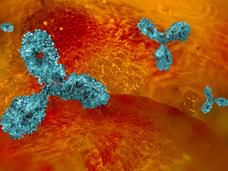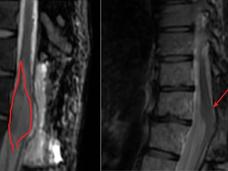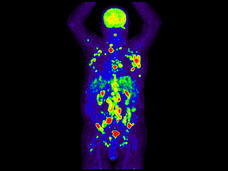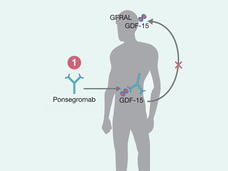Cancer Currents: An NCI Cancer Research Blog
A blog featuring news and research updates from the National Cancer Institute. Learn more about Cancer Currents.
-
Fructose Fuels Cancer Growth Indirectly, Lab Study Finds
Researchers have found that feeding fructose, a main component of high-fructose corn syrup, to lab animals with cancer made their tumors grow faster. But the tumors couldn’t directly consume the sugar—it had to take a detour through the liver first.
-
FDA Approvals Expand Initial Treatment Options for Multiple Myeloma
FDA’s approvals of Darzalex Faspro and Sarclisa, each used in combination with standard three-drug treatment regimens, should change the initial treatment of newly diagnosed multiple myeloma, including for patients who can’t get a stem cell transplant.
-
Experimental CAR T-Cell Therapy Shrinks Tumors in Children with Deadly Brain Cancer
In a small clinical trial, an experimental CAR T-cell therapy that targets the protein GD2 on cancer cells shrank tumors—for 2 years or more in several cases—in children and young adults with diffuse midline glioma, an aggressive brain and spinal cord cancer.
-
One Year in Cancer Research and Much to Celebrate
NCI Director Dr. Kimryn Rathmell reviews some of the most noteworthy cancer research findings from 2024, including advances in immunotherapy for children with cancer, a potential therapy for cachexia, and studies that provided valuable insights into cancer biology.
-
Cetuximab Outperforms Durvalumab for Head and Neck Cancer When Cisplatin Isn’t an Option
The findings from a recent NCI-supported clinical trial are helpful because previous studies for people with locally advanced head and neck cancer have yielded conflicting data for and against several alternatives to cisplatin combined with radiation.
-
Helping Kids with Cancer Speak for the Supportive Care They Need
Younger cancer patients who filled out surveys about their symptoms experienced fewer cancer-related symptoms than those who did not complete the surveys, results from two clinical trials have shown. The findings show patient-reported outcome (PRO) surveys for children can give an accurate picture of how a child is feeling during the stress of treatment.
-
A “Living Medicine:” Engineered E. coli Shrink Tumors in Mice
In a pair of studies, researchers engineered a probiotic strain of E. coli called Nissle 1917 so it can help the immune system attack tumors. Although the E. coli were altered in different ways, resulting in two different immune-based treatment strategies, both were effective in mice.
-
Treatment Strategy for ecDNA-Driven Tumors Shows Potential
Researchers have found that cancer cells containing extrachromosomal DNAs (ecDNAs) have a weakness that can be exploited by a drug that targets the CHK1 protein. In mice, combining the drug with another targeted therapy kept cancer at bay for long periods.
-
Trial Results Support SBRT as a Standard Option for Some Prostate Cancers
In a trial, men who received stereotactic body radiotherapy (SBRT) didn’t have a higher risk of cancer recurrence than men treated with other common radiation therapy regimens that are given over longer periods.
-
How Do Black People with Cancer View Clinical Research?
Black people with cancer are much less likely to join clinical trials than White patients. Results from a new study may help explain why and help research staff talk with and recruit more Black participants.
-
Nivolumab Appears to Boost Cure Rate in Advanced Hodgkin Lymphoma
In a nearly 1,000-patient trial, treatment with nivolumab (Opdivo) and the chemotherapy regimen AVD was better at eliminating cancer and keeping it at bay than the current standard initial treatment for the disease, AVD and brentuximab (Adcetris). The nivolumab combination also had fewer side effects.
-
Bladder Cancer Trial Finds Extended Lymph Node Surgery Doesn’t Improve Survival
A randomized clinical trial comparing two types of surgery in people with localized muscle-invasive bladder cancer found that more extensive surgery removing a larger group of lymph nodes did not improve survival, compared with standard lymph node surgery.
-
Delivering Palliative Care by Telehealth Meets the Needs of People with Cancer
In a study of people with advanced lung cancer, palliative care delivered via telehealth was just as effective at improving patients’ quality of life and other measures of well-being as care delivered in person.
-
Program Connects Adolescents and Young Adults to Quality Cancer Care
A 10-year-old program at an NCI-Designated Cancer Center has had substantial success at increasing the number of adolescents and young adults with cancer who get recommended treatment and services, including greater clinical trial participation and use of fertility services.
-
Will Ponsegromab Be a Game Changer for Cancer Cachexia?
In a clinical trial, people with advanced cancer and cachexia treated with the experimental drug ponsegromab gained an average of 2 to 6 pounds over 12 weeks, depending on the dose they received. Participants treated with the placebo lost an average of 1 pound over the same time period.
-
As More People with Cancer Use Medical Cannabis, Oncologists Face Questions They Struggle to Answer
Up to 40% of people being treated for cancer use cannabis to help with side effects like pain and anxiety. But with evidence from studies on cannabis lacking, clinicians feel ill-equipped to answer patient questions about its safety and effectiveness.
-
Colorectal Cancer Screening: Where Does the Shield Liquid Biopsy Fit In?
FDA recently approved the Shield test, the first blood test for the primary screening of people at average risk of colorectal cancer. Where does it fit in with other screening options for the disease, including colonoscopy and stool tests?
-
Some Women Avoid Breast Cancer Screening After False-Positive Mammogram Results
Some women who receive a false-positive result on a mammogram may not come back for routine breast cancer screening in the future, a new study finds. Better doctor–patient communication about the screening process is needed, several researchers said.
-
Combination Chemo Helps People with Leiomyosarcoma Live Longer
Results from a French clinical trial have identified what experts say should now be the recommended initial treatment of advanced leiomyosarcoma. In the trial, the combination of trabectedin (Yondelis) and doxorubicin improved survival by a median of 9 months.
-
Jaw Problems Linked to Bone-Modifying Drugs Not as Rare as Once Thought
Osteonecrosis of the jaw was thought to be a rare side effect of drugs like denosumab (Xgeva) that lessen bone problems when cancer has spread to the bone. But a new study has found that the painful side effect is more common than once thought.

















